25+ SAMPLE Weekly Construction Report
-
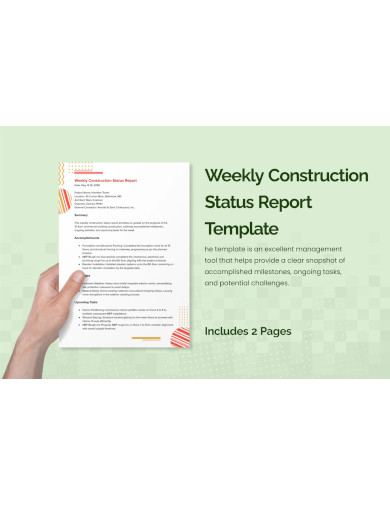
Weekly Construction Status Report
download now -
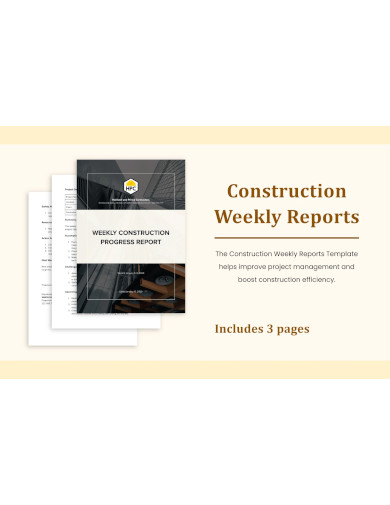
Construction Weekly Reports
download now -
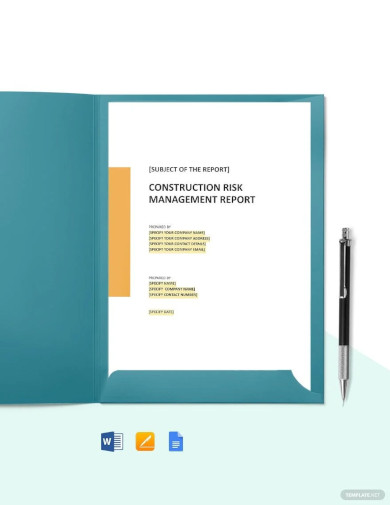
Construction Weekly Quality Report
download now -
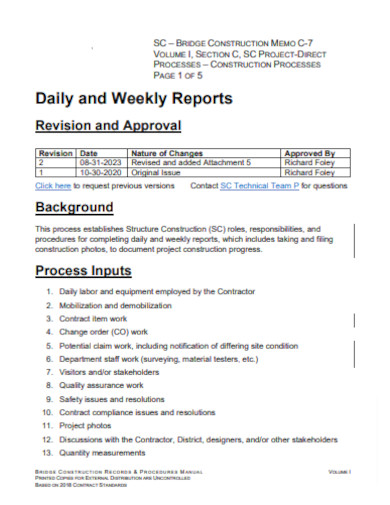
Daily Construction Weekly Report
download now -
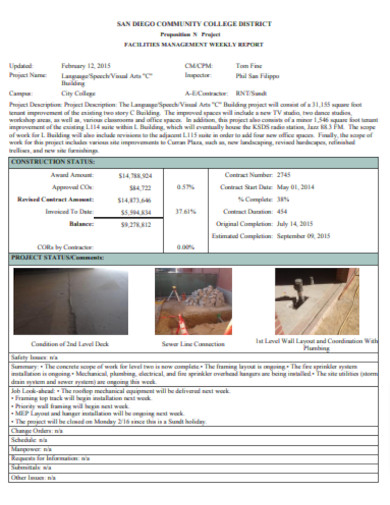
Weekly Construction Report Schedule
download now -
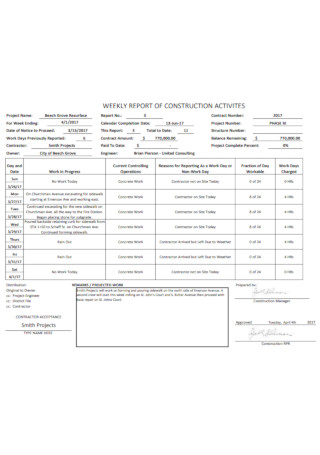
Weekly Report of Construction Activities
download now -
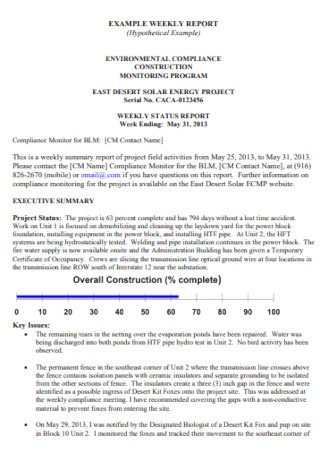
Construction Weekly Report
download now -
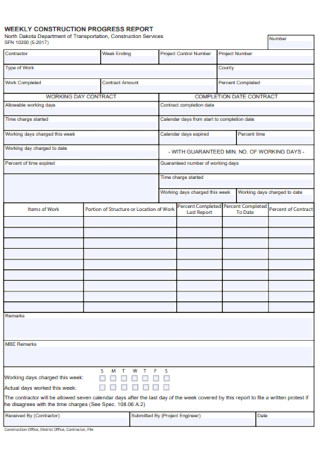
Weekly Construction Progress Report
download now -
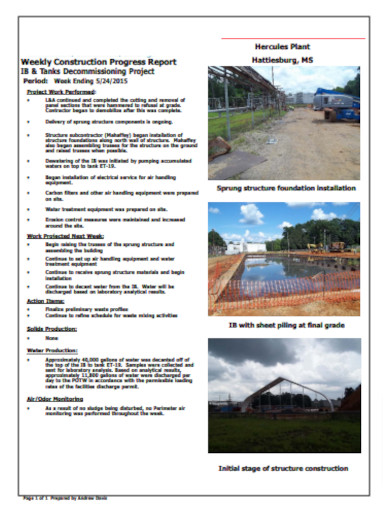
Weekly Construction Progress Reports
download now -
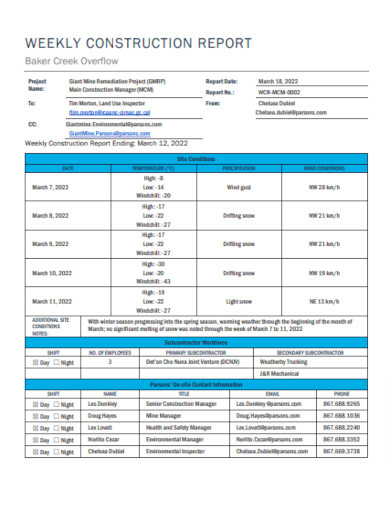
Simple Weekly Construction Report
download now -
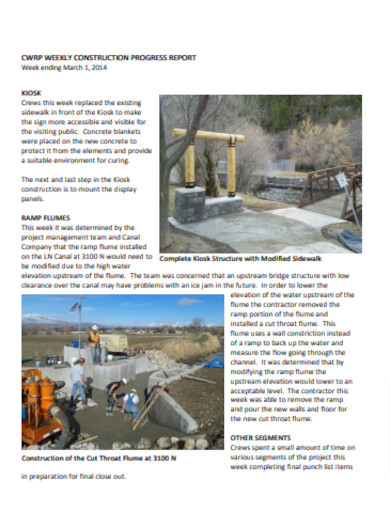
Weekly Construction Report Outline
download now -
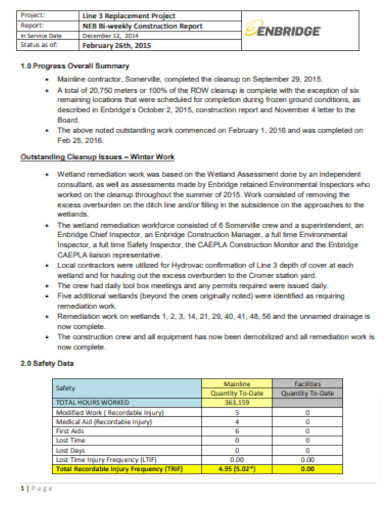
Bi-Weekly Construction Report
download now -
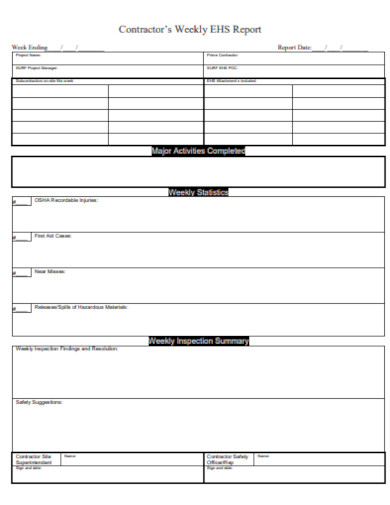
Weekly Construction Contractor Report
download now -
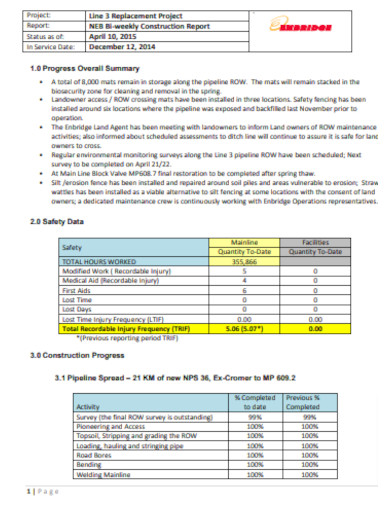
Sample Weekly Construction Report
download now -
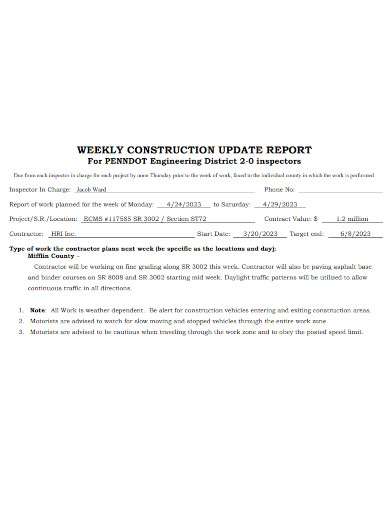
Weekly Construction Update Report
download now -
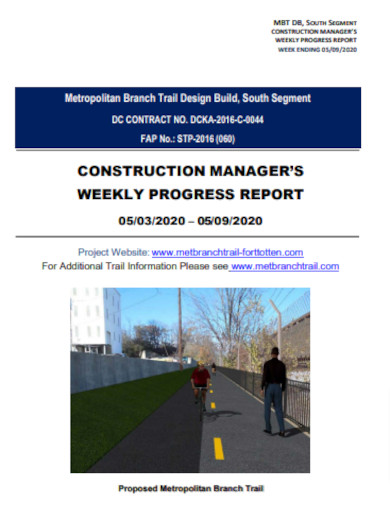
Weekly Construction Manager Report
download now -
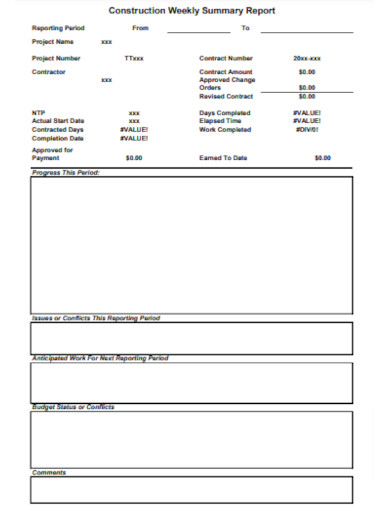
Weekly Construction Summary Report
download now -
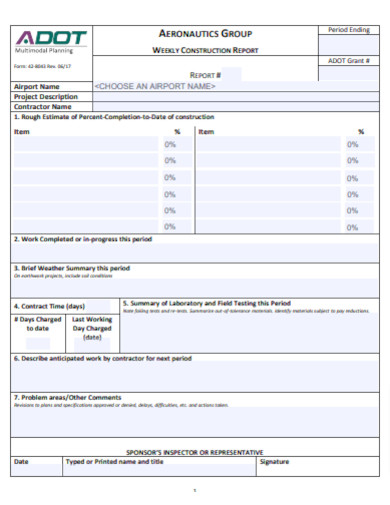
Weekly Group Construction Report
download now -
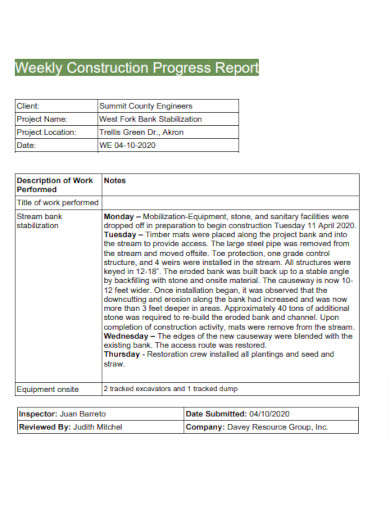
Weekly Construction Report Layout
download now -
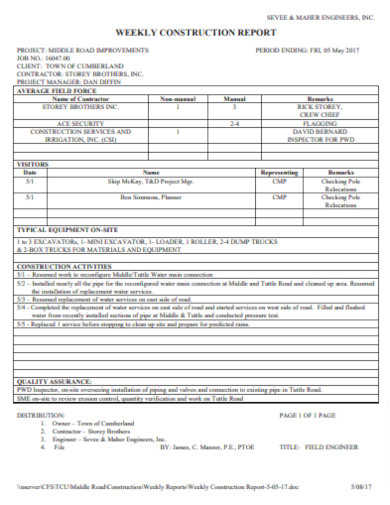
Basic Weekly Construction Report
download now -
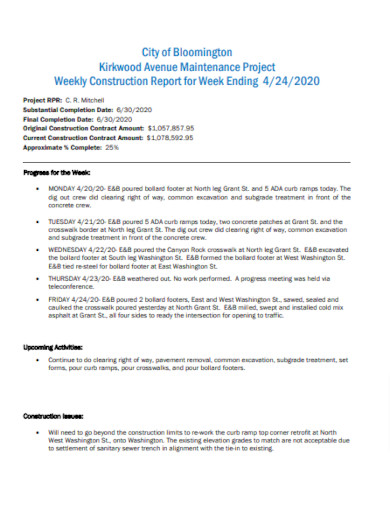
Weekly Construction Project Report
download now -
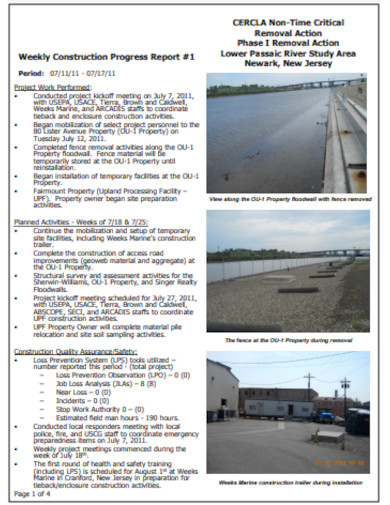
Printable Weekly Construction Report
download now -
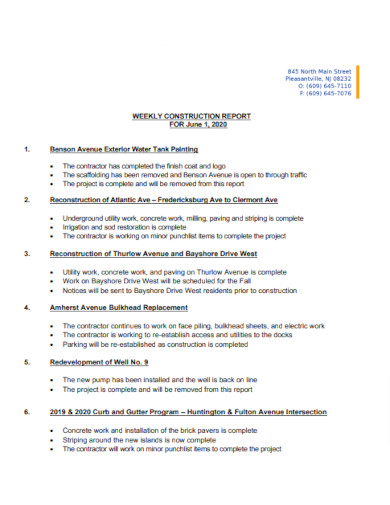
Weekly Construction Report Format
download now -
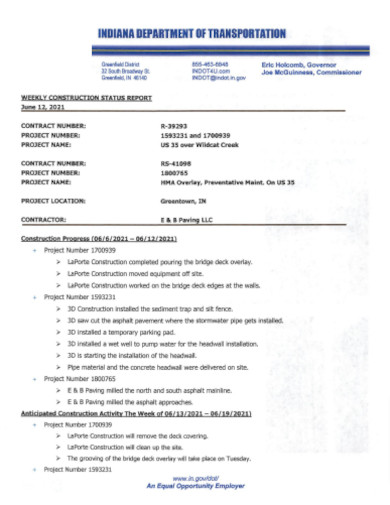
Editable Weekly Construction Report
download now -
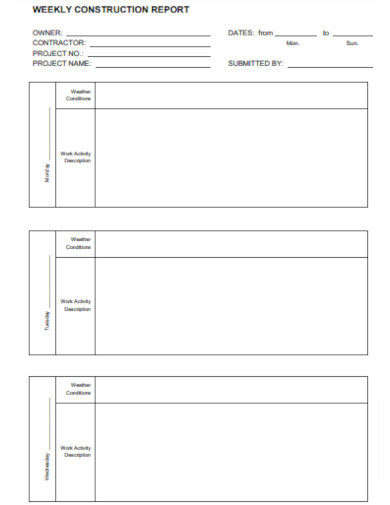
Weekly Construction Inspection Report
download now -
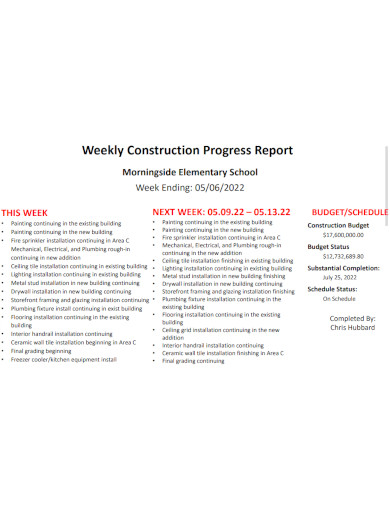
Standard Weekly Construction Report
download now
FREE Weekly Construction Report s to Download
25+ SAMPLE Weekly Construction Report
Definition:
The Essence of a Weekly Construction Report:
Importance of Regular Documentation:
Components of a Comprehensive Report:
Utilizing Technology in Report Compilation:
Challenges and Solutions:
Why is it crucial for construction projects to have regular weekly reports?
What role does the report play in cost tracking and budget management?
How are subcontractor contributions and performances captured in the weekly report?
When should a weekly construction report typically be generated?
Can the weekly construction report serve as a proactive tool for risk management?
Definition:
A Weekly Construction Report provides a summarized account of a construction project’s activities, progress, challenges, and financial report details over a week. This essential tool aids project managers in tracking developments, ensuring stakeholder transparency, and making informed decisions. It typically includes updates on tasks, expenditures, safety protocols, and resource allocation, offering a snapshot of the project’s current status.
The Essence of a Weekly Construction Report:
A Weekly Construction Report encapsulates the week’s activities, progress, challenges, and financial outlays on a construction site. Tailored as a quintessential tool for construction project managers, this document can be pivotal in ensuring stakeholder transparency, enhancing team efficiency, and predicting potential roadblocks.
Project Progress Tracking:
A weekly construction report serves as a dynamic tool for monitoring project progress. It provides stakeholders with a snapshot of the project’s status, highlighting completed tasks, work in progress, and upcoming activities.
Communication Hub:
The report acts as a centralized communication hub, allowing various project participants to stay informed about developments, challenges, and achievements. It fosters transparency and collaboration among teams.
Issue Identification:
By documenting issues and obstacles encountered during the week, the report facilitates timely problem-solving. It empowers project managers to address issues promptly, preventing delays or cost overruns.
Budget and Resource Management:
Weekly reports help manage project finances and resources effectively. They track expenses, labor hours, and materials used, aiding in budget control and resource allocation.
Risk Mitigation:
Identification of potential risks and deviations from the project plan is a crucial role of the weekly report. It allows proactive risk management, reducing the likelihood of unexpected setbacks.
Quality Assurance:
The report can include details about quality control measures and inspections conducted during the week, ensuring that work meets specified standards and regulatory requirements.
Documentation for Audits:
Weekly reports serve as essential documentation for audits and regulatory compliance checks. They provide a historical record of project activities and adherence to industry standards.
Decision Support:
Project managers use weekly reports to make informed decisions. Data on progress, issues, and resource utilization aids in determining the best course of action.
Importance of Regular Documentation:
Weekly updates not only keep the team informed but also play a critical role in ensuring the project stays on track. With this regular documentation:
Legal Protection:
Regular documentation is vital for legal protection. It provides a record of the project’s history, which can be crucial in case of disputes, claims, or litigation. Proper documentation helps prove compliance with contracts and regulations.
Accountability:
Documentation holds stakeholders accountable for their responsibilities. When tasks, deadlines, and expectations are clearly documented, individuals and teams are more likely to meet their obligations and fulfill their roles effectively.
Transparency:
Documentation promotes transparency in project management. It allows stakeholders, including clients and project teams, to access information about the project’s status, progress, and decisions, fostering trust and open communication.
Risk Management:
Documentation is a key component of risk management. It helps identify, assess, and mitigate risks by providing a structured way to record potential issues, track their resolution, and implement preventive measures.
Quality Control:
Documentation is essential for quality control. It provides a basis for inspections, audits, and quality assurance processes, ensuring that work meets established standards and specifications.
Decision-Making:
Well-documented information supports informed decision-making. Project managers and stakeholders can rely on accurate and up-to-date data to make choices that optimize project outcomes.
Project Continuity:
Documentation ensures project continuity. If team members leave or new personnel join the project, comprehensive documentation enables a smooth transition and minimizes disruptions.
Performance Evaluation:
Documentation provides the basis for performance evaluations and assessments. By tracking progress against project objectives and benchmarks, organizations can assess the success of their projects and make improvements for future endeavors.
Components of a Comprehensive Report:
Delving into the intricate details of these reports, one can often find:
Project Overview:
The report typically starts with an overview of the project, including its name, location, and the construction phase it’s currently in.
Progress Summary:
This section provides a summary of the progress made during the week. It highlights completed tasks, work in progress, and any delays or challenges encountered.
Work Planned for Next Week:
This section outlines the tasks and activities planned for the upcoming week. It helps stakeholders anticipate what to expect in terms of project progression.
Safety and Compliance:
Safety is paramount in construction. This section reports on safety measures taken during the week, any incidents or accidents, and compliance with safety regulations.
Resource Allocation:
Information about the allocation of resources such as labor, equipment, and materials is detailed here. This section helps ensure efficient resource management.
Schedule Adherence:
The report includes information about the project schedule, highlighting whether the project is on track in terms of timelines and deadlines.
Stakeholder Communications:
Communication with stakeholders, including clients, subcontractors, and regulatory authorities, is documented to maintain transparency and accountability.
Signatures and Approvals:
To formalize the report, it may include spaces for signatures and approvals from relevant parties, indicating their acknowledgment and acceptance of the report’s contents.
Utilizing Technology in Report Compilation:
In the modern construction industry, technology plays a crucial role in enhancing the compilation and dissemination of weekly construction reports. Here are some ways technology is utilized:
Real-time Updates:
Cloud-based project management platforms allow for real-time updates. Team members can input data from the construction site using mobile devices, making it instantly accessible to stakeholders.
Automated Reporting:
Automation tools can generate weekly construction reports automatically based on data inputs. This not only saves time but also ensures consistency in report formatting.
Multimedia Integration:
Modern reports often incorporate multimedia elements, such as photos and videos, to provide a visual representation of project progress and issues. This visual documentation is easily captured and shared digitally.
Data Analytics:
Construction management software can analyze project data, providing insights into trends, performance, and potential areas for improvement. This data-driven approach aids in decision-making and planning.
Remote Collaboration:
Collaboration tools and video conferencing enable project teams to discuss and review weekly reports remotely, reducing the need for physical meetings.
Security Measures:
Advanced security measures ensure the confidentiality and integrity of sensitive project data, protecting against unauthorized access or data breaches.
Mobile Apps:
Mobile apps designed for construction reporting enable on-site workers to input data directly into the system, reducing the time lag between activities and reporting.
Real-time Dashboards:
Stakeholders can access real-time project dashboards that provide an overview of project status and key metrics without the need for manual report compilation.
Challenges and Solutions:
While technology offers many benefits in compiling and managing weekly construction reports, it also comes with its own set of challenges. Here are some common challenges and potential solutions:
Challenges in Weekly Construction Reporting:
1. Data Accuracy: Ensuring that the data input into the reports is accurate and reflective of the actual on-site conditions can be challenging. Human errors or inconsistencies in data entry can compromise the integrity of the report.
2. Timeliness: Gathering data, compiling reports, and distributing them in a timely manner can be difficult, especially on large and complex construction projects. Delays in reporting can hinder decision-making.
3. Communication: Effective communication between on-site teams and project managers is crucial. Miscommunications or delays in conveying critical information can lead to misunderstandings and project disruptions.
4. Data Volume: Construction projects generate vast amounts of data. Managing and synthesizing this data into a coherent report format can be overwhelming without the right tools.
Solutions to Overcome Challenges:
1. Digital Tools: Implementing digital tools and software for data capture and reporting reduces the risk of data entry errors. Automated data validation can further enhance accuracy.
2. Training and Education: Provide training to project teams on the importance of accurate and timely reporting. This can improve data quality and communication.
3. Integration: Ensure that reporting tools are seamlessly integrated with other project management systems, such as scheduling and cost management software, to streamline data exchange.
4. Quality Assurance: Implement quality assurance checks on reported data to verify its accuracy. This can include random audits or cross-referencing with other project data.
Why is it crucial for construction projects to have regular weekly reports?
Regular weekly reports are crucial for construction projects because they provide a snapshot of project progress, identify potential issues early, facilitate communication among project stakeholders, track resource utilization, and enable informed decision-making. These reports help ensure that the project stays on schedule, within budget, and meets quality standards.
What role does the report play in cost tracking and budget management?
The report plays a critical role in cost tracking and budget management by documenting expenditures, labor hours, and resource utilization on a weekly basis. It helps project managers monitor budget compliance, identify cost overruns or variances, and take corrective actions promptly to ensure that the project stays within its financial constraints.
How are subcontractor contributions and performances captured in the weekly report?
Subcontractor contributions and performances are typically captured in the weekly report through sections dedicated to subcontractor updates. These sections may include subcontractor progress, milestones achieved, issues or delays, safety records, and compliance with project requirements. Subcontractor contributions and challenges are documented to assess their impact on the overall project.
When should a weekly construction report typically be generated?
A weekly construction report is typically generated at the end of each week, usually on Fridays or the last working day of the week. This timing allows for the inclusion of data and updates from the entire week, providing an accurate snapshot of project progress and developments.
Can the weekly construction report serve as a proactive tool for risk management?
Yes, the weekly construction report can serve as a proactive tool for risk management. By documenting project progress, issues, and potential challenges on a regular basis, it helps project managers identify and mitigate risks in a timely manner, reducing the likelihood of costly disruptions or delays in the construction project.
In conclusion, a weekly construction report is paramount for tracking a project’s momentum and addressing challenges head-on. By leveraging such meticulous documentation, stakeholders enhance efficiency, communication, and risk mitigation. Dive deeper into related topics, from construction analytics to project management innovations, ensuring your endeavors remain at the forefront of the construction industry’s evolution.
